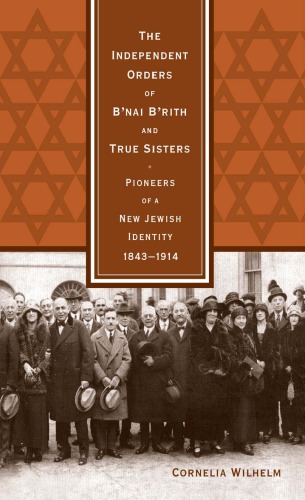

Most ebook files are in PDF format, so you can easily read them using various software such as Foxit Reader or directly on the Google Chrome browser.
Some ebook files are released by publishers in other formats such as .awz, .mobi, .epub, .fb2, etc. You may need to install specific software to read these formats on mobile/PC, such as Calibre.
Please read the tutorial at this link: https://ebookbell.com/faq
We offer FREE conversion to the popular formats you request; however, this may take some time. Therefore, right after payment, please email us, and we will try to provide the service as quickly as possible.
For some exceptional file formats or broken links (if any), please refrain from opening any disputes. Instead, email us first, and we will try to assist within a maximum of 6 hours.
EbookBell Team

4.0
36 reviewsFounded in New York City in 1843 by immigrants from German or German-speaking territories in Central Europe, the Independent Order of B'nai B'rith sought to integrate Jewish identity with the public and civil sphere in America. In The Independent Orders of B'nai B'rith and True Sisters: Pioneers of a New Jewish Identity, 1843-1914, author Cornelia Wilhelm examines B'nai B'rith, and the closely linked Independent Order of True Sisters, to find their larger German Jewish social and intellectual context and explore their ambitions of building a "civil Judaism" outside the synagogue in America.
Wilhelm details the founding, growth, and evolution of both organizations as fraternal orders and examines how they served as a civil platform for Jews to reinvent, stage, and voice themselves as American citizens. Wilhelm discusses many of the challenges the B'nai B'rith faced, including the growth of competing organizations, the need for a democratic ethnic representation, the difficulties of keeping its core values and solidarity alive in a growing and increasingly incoherent mass organization, and the iconization of the Order as an exclusionary "German Jewish elite." Wilhelm's study offers new insights into B'nai B'rith's important community work, including its contribution to organizing and financing a nationwide hospital and orphanage system, its life insurance, its relationships with new immigrants, and its efforts to reach out locally with branches on the Lower East Side.
Based on extensive archival research, Wilhelm's study demonstrates the central place of B'nai B'rith in the formation and propagation of a uniquely American Jewish identity. The Independent Orders of B'nai B'rith and True Sisters will interest all scholars of Jewish history, B'nai B'rith and True Sisters members, and readers interested in American history.